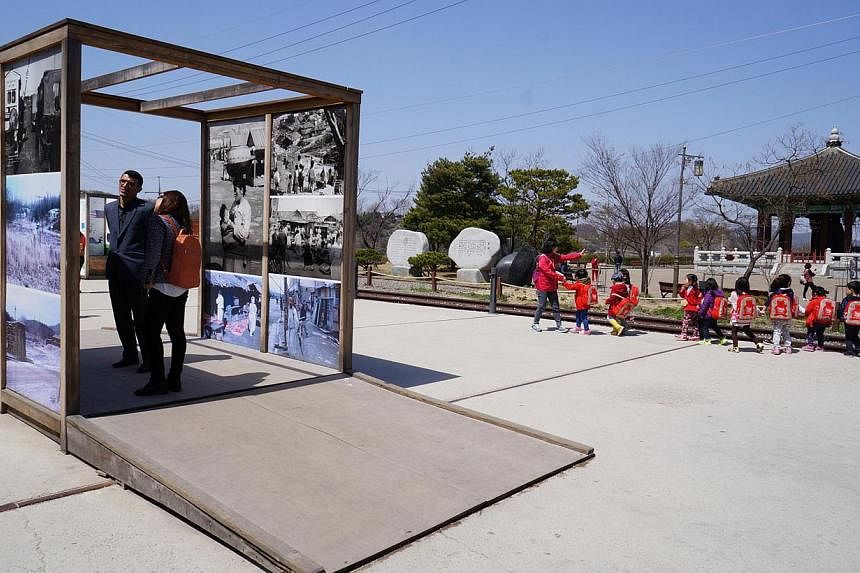A SONG that most children in South Korea grew up singing goes like this: Our wish is unification, even in our dreams...
This wish has yet to come true after 70 years of division, but one big step forward that could narrow the gap between the rich and advanced capitalist South and the reclusive and impoverished communist North, and pave the way towards unification, is to resume stalled economic cooperation.
Riding on links already established, South Korea could urge more companies to invest in and collaborate with North Korea, said Seoul Mayor Park Won Soon.
"It is important to further develop the (inter-Korean) Kaesong Industrial Complex and encourage South Korean companies to participate in SOC (system-on-chip) development and mineral resources development in the North," he said on the topic of unification at the recent World Journalist Conference (WJC) in Seoul. "This could pave the way for new exchanges and new opportunities for the two Koreas."
Economic expansion is vital to North Korea, where the majority of its 24.9 million people live in poverty. Its economy is about 40 times smaller than the South's, according to 2013 figures from South Korea's central bank, and its gross domestic product per capita is a mere US$1,800 (S$2,394.86), compared to the South's US$32,400.
Change is already taking place in the North, under the pragmatic albeit volatile leadership of third-generation successor Kim Jong Un since 2012.
Realising the importance of economic growth and putting it on par with nuclear development, he has already created 20 new special economic zones, reformed foreign investment rules and even held an investment forum in China's Dalian city last year.
Observers say that capitalism is growing quietly but surely within the state, which was forcibly separated from the South after World War II in 1945.
British broadcaster BBC noted there is now a "quiet revolution" going on in North Korea, while Washington Post reported that factories operated by North Koreans in China's border city Dandong is "helping North Korea's economy to thrive".
"For the first time in North Korea's history, change is coming bottom up. North Korea has under our nose become a capitalist state," said Seoul-based British journalist Andrew Salmon, who addressed the issue of unification as member of a panel on the subject at the conference.
He spoke of how North Koreans first crossed the border to China to bring back food during severe famines in the 1970s and how by now, a "primitive" market system has taken shape, allowing people to buy what they want if they have the right currency.
The introduction of reforms in the North to liberalise the economy has also generated positive buzz and resulted in a perhaps overly optimistic prediction of 7.5 per cent economic growth this year by South Korea's Hyundai Research Institute. This is almost double that of South Korea's 3.8 per cent forecast. A Bloomberg report had experts predicting a 4 per cent to 5 per cent growth rate for the North if farmers are allowed to keep more of the earnings from their crops.
Russia, for one, has shown an interest in Kaesong, with Russian ambassador to Seoul Alexander Timonin saying last month that a food production project is among many possible collaborations being discussed.
Opened in 2004 within the demilitarised zone separating the two Koreas, the joint industrial zone is home to 124 small and medium-sized South Korean companies that hire about 50,000 North Korean workers.
It was supposed to be a model for cross-border cooperation championed by former South Korean president Kim Dae Jung, providing steady income to the North and cheap labour to the South. But the only sustainable joint project often bore the brunt whenever tensions escalated between the two sides, such as in 2013 when it was closed for five months amid heightened tensions after Pyongyang's nuclear test in February 2013. The latest dispute at Kaesong, however, was economic, with the North's unilateral decision to increase wages in February this year. It remains unresolved.
The crucial renewal of economic ties hinges on South Korea's willingness to ease the so-called May 24 Measures. Implemented by South Korea in response to Pyongyang's sinking of its Cheonan warship in waters close to the North Korean coast, in 2010, these sanctions have stalled inter-Korea trade and stopped new investments in the North outside of Kaesong.
Seoul mayor Mr Park, among others, has called for the May 24 sanctions to be lifted. "It is important to bring the North back to the dialogue table and set a starting point for exchanges and cooperation," he said.
Calling the sanctions a "stumbling block" to inter-Korea cooperation, Ms Na Kyung Won, chairman of the National Assembly Foreign Affairs Committee, said at the conference that South Korea should "come up with some new measure to overcome the current impasse in a pragmatic and flexible manner".
South Korea's Vice-Foreign Minister Cho Tae Yul, who also spoke at the conference, said President Park Geun Hye's government is committed to building trust with North Korea and proactively creating an environment conducive to unification.
Earlier reports had estimated that the two Koreas could be unified by 2040 to 2050, at a cost of more than US$500 billion - a price that few South Koreans are willing to bear.
For now, Mr Salmon hopes that global powers would shift their attention away from the nuclear issue and focus on trade instead, since international sanctions have, in his words, "failed dismally" to deter North Korea from developing nuclear weapons. Both the United States and the United Nations Security Council have imposed several economic sanctions on North Korea over its nuclear programme.
"Let's delink business from politics. Let the businessmen go in, let's engage North Korea, and see if that works," he said.


